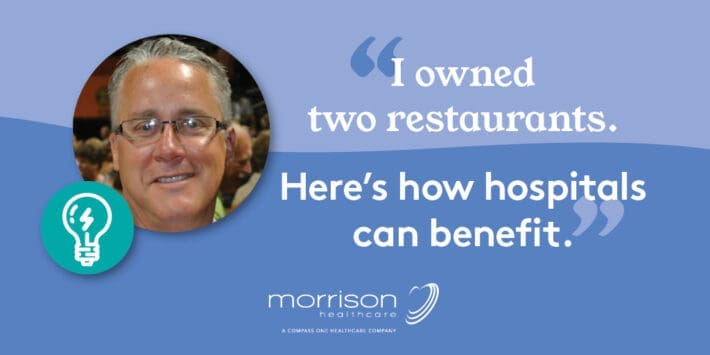I Owned Two Restaurants. Here’s How Hospitals Can Benefit
By Robert Resmondo, Morrison Healthcare Regional Director of Operations, Knoxville, Tenn.
I oversee hospitals in Tennessee, Kentucky and Mississippi as a Regional Director of Operations (RDO) for Morrison Healthcare. But my experience as the owner of two Italian restaurants in Orlando many years ago gives me a unique perspective that helps serve our clients and lead our associates.

As a restaurant owner, I needed to be autonomous. I was responsible for everything – I negotiated the lease, handled our finances and determined the menu. I learned a ton about how to operate a business and make it profitable.
But my job was much more than executive decision-making. To save money, I was also the CHM – Chief Handy Man. The restaurants had flat roofs and when they leaked, I couldn’t afford to call a repair person. I would go to Home Depot, learn how to fix it, and do it myself. And I did the same when a toilet leaked or a sink wouldn’t work. I became a handyman because if I saved money, that’s more profit for the restaurant.
On the flip side, there are several benefits to working for Morrison and other large foodservice companies. For starters, all of us benefit from the extraordinary amount of investment the company makes in training and developing our associates.
And I thoroughly enjoy the group setting that enables all of us to share information and develop our skills. It certainly beats the occasional isolated feeling of trying to solve every problem at the restaurant by myself. I’ve been with Morrison just more than four years, but the culture here feels like a small company because of the way people are treated.
The work/life balance is also a huge benefit. While we all work hard and do what it takes to get the job done, after working nights and weekends as an owner, I probably appreciate the regular hours more than most people.
After running two restaurants and working for 15 years for a corporate food service company, here are a few lessons I’ve passed on to my directors:
Make Every Client Request a Top Priority. My experience in running a business gives me a perspective about client relations that I can pass on to others. One of the most important lessons I teach is to respond quickly to any client request. It’s their business and if they need something done, it’s automatically a top priority for all of us.
I also make certain we focus on the issues that are most critical to the client. While there are several tasks and assignments each of us need to handle every day, nearly all our clients want us to do two things well: Improve their patient satisfaction scores and stay within our budget. When my directors are struggling with managing a host of requests, I’ll remind them, “you can’t major in minor things.”
Make an Impossible Request Work. I try to teach them to listen closely to a client’s request and develop creative solutions to solve a problem. There are times when every RDO gets a request we really can’t afford to deliver. In these cases, I think about the request and determine if we can give them a version we can afford.
Here’s a good example. At a former job, I was responsible for providing food services for various colleges and universities. A university chancellor came to me and asked if, during final exams, we could provide a free, full breakfast to thousands of students. I knew we couldn’t afford to do that, but I went back to our chefs to come up with an alternative. They responded with a “to-go” meal that included two pieces of French toast, syrup and bacon in a cup.
While it wasn’t a full meal, it did the trick and was well received. The lesson here is that instead of denying the client’s request, we worked together to deliver a great experience for the students that fit into our budget.
It’s Not Personal, It’s Business. No matter how hard we try, there will always be some conflict with a client. When a director or manager receives a complaint, they often take it as a personal criticism – but this isn’t the right approach.
When these events happen, I ask my team to put any complaints into the right perspective. Our job is to help them, so we need to respond in a professional manner and put aside any hurt feelings. I ask them to step back for a moment, consider their complaint or problem and respond properly.

The goal is to make certain our clients view us as a preferred employer. Contracts always expire and we want to make sure ours are renewed. To achieve that goal, I’m a big believer in servant-style leadership; if they aren’t successful, neither am I.
Helping Associates Succeed. I try my best to treat all associates with respect and help them succeed. And I do a lot of listening to them to make certain I know their concerns.
Fortunately, I work in a district where Tim Bumann, our Regional Vice President believes in an empathy style of leadership and supports me.
Don’t Forget to Enjoy Life. For most of us, our work takes up a lot of our time and energy. But we enjoy a culture where a work/life balance is encouraged, so take advantage of it. In my off hours, I do a lot of cooking, reading, and playing golf. But most of my energy goes into being a father to my two daughters.
After Kobe Bryant passed away, I read a story where he was asked if he regretted not having a son. “I’m a girl Dad,” he replied, and my daughter is going to be an amazing player. Well, I’m a girl Dad too. It’s the greatest joy I have in life.

